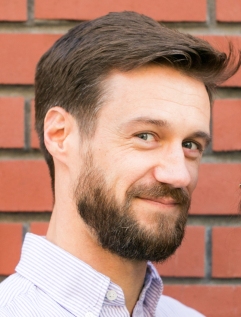
Dr. Mark Lescroart
Mark Lescroart is a research scientist in the Gallant laboratory at UC Berkeley. He got his PhD in 2011, working with Irving Biederman at USC. Mark also went to USC for undergrad, and graduated in 2002 with a B.S. in Psychobiology and a minor in Japanese. Mark studies the way our brains transform patterns of light on our retinas into useful information about the shape and structure of objects in the world. He has also written popular science articles for Scientific American Mind, and was awarded a Ruth L. Kirschstein National Research Service Award fellowship for his research. He likes to swing dance and has a baby daughter named Claire.
Abstract: Thoughts on shape and the shape of our thoughts
Most people think that seeing happens in the eyes, but many aspects of our perception of the world are determined by neural computations that occur in the brain. Visual perception proceeds like modern graphics in reverse: the brain receives an image on the retina and infers the 3D structure that generated that image. In my talk, I will describe what we know about the perception of shape, and how different regions of the human cerebral cortex represent different kinds of image features (for example, the locations of object boundaries and the orientation of surfaces in a room). Finally, I will show how we can use brain activity to make coarse reconstructions of scenes that people saw while their brains were being scanned.
I thought this was a pretty interesting seminar. I’ve always been fascinated with how exactly our brains work, so it was cool to hear a more detailed explanation for something as complex as vision. Something else that struck me during the talk was just how tiny this complicated process is when compared to the rest of the brain. I could imagine the way this visual information ripples out through the rest of the brain, effecting more and more calculations being made throughout the rest of the organ.
One thing that disappointed me about this talk though, was how it was really only about how the brain physically processes vision. To me, its far more interesting to see what images are running through someone’s mind, not what they’re looking at.
LikeLike